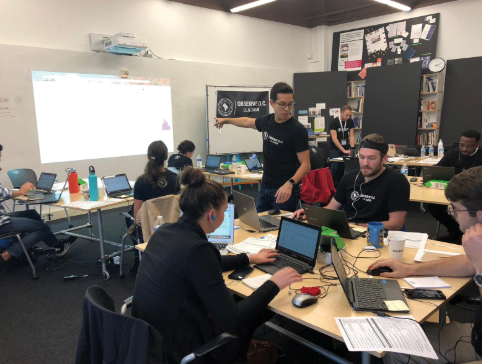Observe D.C. founder Ben Mindes (GRD ’19) testified that the Washington, D.C. Board of Elections effectively conducted the D.C. mayoral election in front of the D.C. Council on Feb. 19.
“Overall, voters experienced an efficient and well-organized election day,” Mindes said in his testimony.
The testimony follows a 14-hour-long observation of the Nov. 6 election day by Observe D.C., a nonpartisan election observation initiative, in which 83 trained volunteers collected data from a random sampling of polling places to ensure the integrity of local elections. Volunteers observed that most polling stations contained the proper voting equipment, opened by 7:10 a.m., were designed to allow voters to cast their ballots in secret and had disability-accessible entrances, according to the testimony.

Despite these promising signs, the election observation still revealed some issues, Mindes said.
“There’s certainly room for improvement in D.C., and what we found is that there’s certain areas with administrative and procedural issues that can be changed in D.C.,” Mindes said in an interview with The Hoya.
According to Mindes’ testimony, zero tape, a machine-created printout verifying that no one had voted before 7 a.m., was not posted by the time the polls opened in 28.9 percent of polling places, and 19.5 percent of polling places did not immediately make results public after the polls closed.
Mindes also testified that 52.4 percent of polling places had voters in line by the time of the polls’ official closing at 8 p.m. and 18 percent of polling places experienced technical difficulties with the voting machines. Mindes notes, however, that all who wished to were still able to vote and that technical issues were usually quickly resolved by the D.C. Board of Elections.
These data were collected by the volunteers, who were stationed at the polling stations from before they opened at 7 a.m. until the last voters had cast their ballots. Findings were reported to Observe D.C.’s call center throughout the day.
Observe D.C.’s assessment marks the first sample-based observation of an election in U.S. history. Sample-based observation has been used by civic groups worldwide to assess and monitor election day practices and to ensure elections are carried out according to proper rules of compliance.
“The data that comes from a sample-based observation is the only independent and statistically valid data about what happens on election day,” Mindes said.
The diversity of voting procedures within the thousands of voting jurisdictions means that sample-based election observations in the United States must remain hyper-localized. However, observations remain an important tool for identifying and solving problems unique to certain jurisdictions, such as the ones identified in the D.C. mayoral election, according to Mindes.
Sample-based observations could be a useful tool for improving the electoral processes in other jurisdictions, according to Mindes. Observe D.C. is compiling a comprehensive final report to share with the D.C. Board of Elections, D.C. voters and candidates.
“We think that there are places in the United States that could certainly use an injection of public confidence in their election administration, certainly after the 2018 election, and we’re hoping to bring sample-based observation methodology to those places,” Mindes said.
The results of a Nov. 15 poll by the Pew Research Center revealed that 53 percent of Americans believe elections in their communities were run very well. Confidence in national elections was lower, with 21 percent of Americans responding that elections were run very well.
Mindes worked for the past two years as program officer on the elections and political processes team at the National Democratic Institute for International Affairs, which he credits as having a huge influence on his decision to found the intiavative.
Observe D.C. was funded by the Baker Center for Leadership and Governance, a Georgetown center that provides programming in leadership development, as a recipient of a $20,000 Baker Innovation Grant. The Baker Center team expressed a positive assessment of the Initiative’s work in an email to The Hoya.
“Observe DC gave so many people across the city the opportunity to engage meaningfully in our local elections, and we look forward to seeing Ben expand his initiative to reach new communities in the coming years,” they wrote.





















